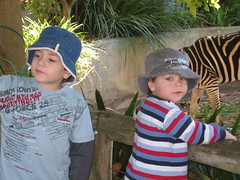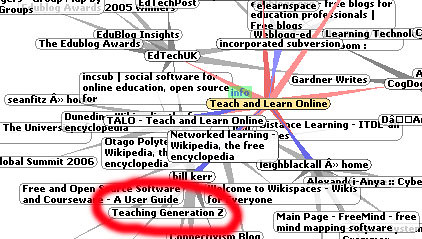Leigh recently posted about his sense of isolation regarding some of his views on LMS, PLE and e-Portfolios. I got the feeling he was feeling a bit like the lone voice in the wilderness and everything he writes really makes me think so I thought it would be an ideal time to give him some feedback on the aspect I felt that I could comment on, the concept of e-Portfolios. Well, I think I got more than I anticipated and I think Leigh should feel heartened by the level of debate that followed throughout the comments (11 at last count and that doesn't include some of the TALO discussion group posts) and I put some of my own embryonic thoughts to the test.
A bit of background - I was able to go to the E- Portfolio Professional Learning Conference where the keynote presenter was the renown e-Portfolio expert, Dr. Helen Barrett. Prior to the conference I had blogged my initial thoughts using Leigh's original post ePortfolios. I don't get it! and looking at the way he has structured his wiki had me thinking that with all this Web 2.0 stuff floating around, it would be the ideal way to use a "small pieces, loosely joined" approach to this concept of a portfolio that lives in cyberspace. However, Leigh, for his own reasons, seemed very negative about e-Portfolios so via my comment I thought I'd see if he would expand. Here's a snippet of what I wrote:
I think your objections mainly stem from the keep it all in one spot, locked away under password, present only your best bits, preformatted approach which is the favoured format from those high up in the education halls of power who would desire uniformity from their employees. But your practice, as showcased in your wiki shows that a vibrant, evolving personalised professional online presence is something worth developing and maintaining. Is calling it an e-Portfolio such a bad thing?
And expand he did:
Hey Graham, good point... and it is the name I hate - ePortfolio.. I agree with Bill, its pretentious and doesn't help the problem of when academics hear the word blog, they hear a word that sounds like poo, or a wet towel on a line, or a chocolate bar.. they don't hear a word that sounds academically minded... perhaps the word blogfolio achieves what you are aiming for G, a compromise that helps to bring resistance over. But in the end, I want the "free range" thinking to be respected and refered to for what it is.. and I think that's more than simply a way of doing things, its a subversive and political gesture that asks significant questions of powerful economic exchanges. "why are we buying that licence? who owns this content? what's our responsibility to the author of that content? is the classroom a good way to learn? etc.
Then Alex Hayes weighed in with his take.Here's a sample of what he wrote:
We are all battling red-tape-dispensers, arcadian pyschotropic coffee morning-meetings-which-get-nowhere, PLE's, PLC's , LMS's, OLE's , CMS's, ins/outs, blank looks and faithless moronic back-handers.
E-portfolios,blogfolios and the conversation resultant is no more than stammering for the correct nomenclature in a crowded parlour of blogger poo-dom and we all know it.
Ask any 15 - 36 year old bedoper what an e-portfolio is and you will get an interesting answer . no ....you cant take it to the mosh pit in fact try and find it when you've finished your course !!
Ask any cardie' the same question and you'll realise that the 'e' in e-portfolio is like the 'm' in m-learning.
Put there to secure funding, to entertain acronyms, to joust with the 'free rangers'.
Now Alex is an extremely talented writer and at this point I thought maybe I've bitten off more than I can chew, but I thought it would be good for me in my own clarification if I doubled back and had a go at addressing what he had said. Too often in the past in my professional life I have backed away from my own opinions for fear of being exposed as someone who hadn't thought through things but this was a risk that promised to be a fruitful, if humbling, learning experience. An excerpt from my next comment:
If e-Portfolio is only a word, what's the big deal? I must be missing something (highly likely, I'm just a primary school teacher) but how is the term "e-Portfolio" any worse than any other buzz phrase or common usage word in education today? I can't see why the term can't be defined by Web 2.0 technology users / educators at the grassroots - in fact, it would be better than just leaving it to be defined by those high up on the education food chain. We could (edubloggers in general) define what an e-Portfolio is, provide the links to the world to concrete examples so that someone like Leigh could be saying, "This is what an e-Portfolio looks like in the connected world and here's mine as an outstanding example."
Leigh's next comment was important because it revealed his thinking more clearly to me. I was starting to get where he was coming from. But did Alex and he fully get my viewpoint? Read on:
G, I think you're right, but I think ePortfolio is still more than a word. I think you're right if all we are talking about is a portfolio in the digitally networked world - but as you alluded to in your first comment, it is a word that panders to old schoolers, managers and academia who refuse to acknowledge the digitally networked world in the terms that are current. This provides charlatans with the opportunity to sell false things like ePortfolio software and servers, which in turn leads teachers into yet another false reality, which leads our kids into schizophrenic learning... out there is the way things are really done - in here is the way we do things in school.
Alex's next comment was also extremely insightful and put my comments to the blowtorch they deserved in his own clever way. His final paragraph was pure gold (my own emphasis in bold):
There are a billion good ideas flying around out there and in here. The only ones that have global resonance are those that hit the ground running. Realising that the key elements of professional portfolios are imbedded in the individuals ability to demonstrate and action social change, realise social dividends, connect others to knowledge and weather the organisational-flack-attack are in my opinion the portfolio we should be carrying around with us ....so to speak. I rarely shoot things down cause'my eye sights failing anyway from too much Halo.
That was really cool. What I had written must have had some credibility to warrant such responses and I really learnt something from both Leigh and Alex in this exchange. A classic example of the power of blogs and the conversations that can occur to define things at the grassroots level. And I think I even got Leigh to moderate his viewpoint as well!
.......I really appreciate you taking me up on this issue, as it has helped me to see that for some, ePortfolio is simply a conceptual use of web2 technologies - which I think is totally OK. My previous experience with the term however has been at the hands of horrid academics who on the one hand dismiss blogs and wikis, while on the other embrace ePortfolios - because they paid for a special ePortfolio software... So, I think we have hammered out an understanding......
As I mentioned in my final comment there, I think we are still exploring and working on what e-Portfolios could look like here in South Australia. The group who have met earlier this year are pretty green (myself included) but that means without restrictive pre-conceptions, maybe some useful user-friendly and user-controlled models can emerge that can evolve with the Web 2.0 world. Thanks, Leigh and Alex, for the great conversation.



 Photo by
Photo by 